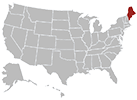
If you stumbled upon this article, you must want to become an optician in Maine!
This is a great occupation for those who want to help others, work with people, and in the healthcare field!
Without further ado, let’s see what this occupation is all about!
Page Navigation
Optician Job Description and Duties in Maine
Not everyone has a 20/20 vision, and opticians help these folks achieve it!
For this, they need to keep in mind what the patient prefers as well as their needs, and in some cases, it is hard to find a good match for both.
Next, you can see a list of tasks most commonly completed by opticians:
- Preparing eyewear
- Fitting and adjusting eyewear
- Educating customers about eyewear issues and maintenance
- Keeping sales records
- Determining insurance co-pays
- Keeping the inventory
- Interacting with the labs that make lenses
Other tasks may also occur, either daily or once in a while, so the list is not complete.
Opticians are not allowed to perform:
- Eye inspection
- Eyewear prescription
Optician Job Requirements in Maine
The Maine State Board of Optometry oversees the opticians practicing in this state and issues the licenses.
While individuals are expected to pass the exam organized by the Board four times every year, there are no minimum requirements as far as education or training go.
Employers usually seek people with or who are:
- Good interpersonal skills
- A high school diploma or GED
- Reliable
- Clean criminal record
- Detail-oriented
Optician Education in Maine
Despite needing a license in Maine, this state has no schools offering specialized training for this field.
It is common, however, to get hired with no experience and get trained on the job.
Those who want to attend formal training, perhaps even earn a degree, would have to consider colleges from adjacent states or online programs.
Depending on the route you choose, of course, your training or education will have a different duration.
The least you can expect is a few months, and the most a minimum of 4 years.
You’ll have to check the enrollment requirements with the school or employer beforehand.
Expect to be asked for at least a high school diploma or GED.
Most schools, on the other hand, would expect minimum grades in specific subjects among other prerequisites.
In a formal educational setting, the following subjects will be taught:
- Introduction to Optometry
- Ocular Anatomy
- Systems 1: Neuroscience
- Ocular Microbiology
- Ophthalmic Imaging
- Public Health Optometry
- Glaucoma
- Physics
- Math,
- English
Apprenticeships might expect the individual to study a bit on their own too.
Optician Certification in Maine
The Maine State Board of Optometry oversees the licensing process in this state.
There are a few stages to complete.
Candidates are expected to first pass the following exams:
- American Board of Opticianry (ABO) exam
- National Contact Lens Examiner’s (NCLE) exam
The scores then need to be sent to the National Board of Examiners in Optometry (NBEO).
The test organized by ABO is for vision correction glasses and the one organized by NCLE is for contact lenses.
These exams have national recognition, as one could expect from their names.
Both the NOCE and CLRE have these levels of difficulty:
- Beginner
- Intermediate
- Advanced
For NOCE you need to know:
- Ho to read prescriptions,
- How to fit and dispense spectacles
- How to use standard ophthalmic equipment
For CLRE, you’ll be tested on:
- Pre-fitting for lenses,
- Diagnostic fitting,
- Dispensing of lenses,
- Patient education,
- Delivery
- Follow-up
You’ll have to pay around $200 for NOCE and CLRE each and score at least 70%.
NOCE and CLRE are organized at the Prometric testing centers.
These two certifications expire after 3 years, and thus you’ll need to prepare to renew them by continuing your education.
Optician Employment and Salary in Maine
Work can be found at these facilities:
- Stores
- Offices
- Optometry practices
- Hospitals
- Clinics
If you want to know how much you’ll earn, keep in mind that these factors will determine this aspect:
- Job title
- Location
- Job duties
- Certification(s)
- Management roles
- Sales vs. technician roles
- Experience
This table shows the average salary in Maine’s major urban areas.
Annual Salary Range:Average Salary of Opticians in Maine
| City Name | Salary |
|---|---|
| Portland | $46,939 |
| Lewiston | $46,459 |
| Bangor | $43,893 |
| South Portland | $46,939 |
| Auburn | $46,459 |
| Biddeford | $46,716 |
| Sanford | $48,115 |
| Brunswick | $46,524 |
| Scarborough | $46,939 |
| Saco | $46,843 |
Regional Salary in Maine
| Region | Employed | Avg. Annual Salary | Avg. Hourly Pay | Top 10% Annual Salary | Bottom 10% Annual Salary |
|---|---|---|---|---|---|
| Bangor, ME | 40 | $45,640 | $21.94 | $59,720 | $36,150 |
| Portland-South Portland, ME | 80 | $49,090 | $23.6 | $63,150 | $38,950 |
* Employment conditions in your area may vary.
Additional Information for Opticians in Maine
If you ever need more help to find an apprenticeship or a job, you definitely can use these resources:
- American Board of Opticianry & National Contact Lens Examiners (ABO-NCLE)
- American Optometric Association
- Association of Schools and Colleges of Optometry
- Commission on Opticianry Accreditation
- National Optometric Association
- Maine Optometric Association
- Maine Society of Eye Physicians and Surgeons




